Game Review
by Kennedy,Death Note Killer Within
Game Review
| Synopsis: |  |
||
Aided by a supernatural notebook that lets him kill with just a name and face, the brilliant and jaded Light Yagami wants to become god over a new world in which he is judge, jury, and executioner. He's known to the world as “Kira.” But a brilliant detective named L, whose real name is unknown to Light, is out to find and stop him. In this social deduction game, players will be placed on either team L or team Kira, and try to bring the other side to justice. Review codes of the game for PC and PS5 were supplied to ANN. |
|||
| Review: | |||
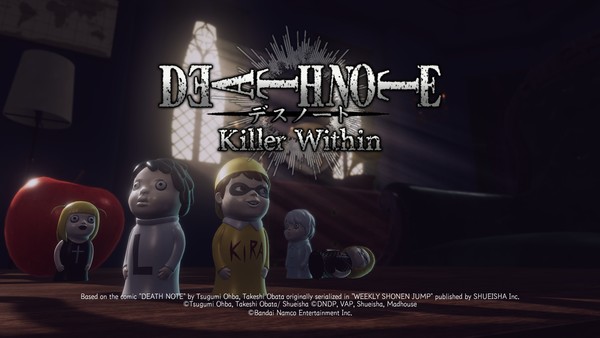 ©Tsugumi Ohba, Takeshi Obata/ Shueisha ©DNDP, VAP, Shueisha, Madhouse ©Bandai Namco Entertainment Inc. If there was ever going to be an anime-flavored online social deduction game, Death Note was always the obvious choice for an IP to tie it to. Not only is it super popular, but what is Death Note if not one long social deduction game? Its story readily lends itself to the genre perfectly; it just makes sense. Thus we have Death Note Killer Within (henceforth KW). Although it's not strictly necessary to have already finished Death Note to play and enjoy KW, the coat of Death Note paint covering this game is thick enough I can't imagine many non-fans would be interested in playing this game in the first place. KW makes no attempts to retell the story of Death Note—it assumes the player is already familiar with it, and just uses it as a framework. But even so, it's not hard to infer that however it happened, L and Light are caught in a game of cat-and-mouse with one another, and that's the context in which this game is taking place. Those unfamiliar with Death Note won't get the many references to it made throughout KW, and that might make certain aspects of it (EX: what's with the notebooks? Why does Kira have to judge criminals? Who are these other characters we sometimes catch glimpses of?) confusing since the game assumes you're familiar with Death Note, but I don't think this happens to enough of an extent that it makes the game impossible to understand for these players. 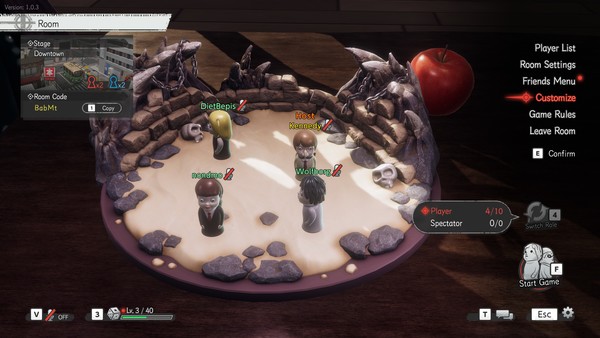 ©Tsugumi Ohba, Takeshi Obata/ Shueisha ©DNDP, VAP, Shueisha, Madhouse ©Bandai Namco Entertainment Inc. At its core, KW is a mostly standard-issue online social deduction game. Players will randomly (although there is a setting you can toggle which allows players to select preferred roles, though it won't necessarily guarantee they'll get it) be put on team L or team Kira. Team L consists of L and up to 8 investigators, whereas Team Kira consists of Kira and up to one follower. They're represented visually by Near's finger puppets (and I know that not everyone—myself included—particularly likes the look of them, but admittedly, this still is a clever nod back to Death Note), although there are other items you can earn to customize them, as well as other purchasable avatars that resemble the first run of Death Note nendoroids. Each match consists of anywhere from 4–10 players, with there always being at minimum an L, at least one investigator, and a Kira. Although team Kira, if it has two members, will know who's on their side, the members of team L won't have any idea. Similarly, the members of team Kira don't know who L is. Team L's goal is to catch and arrest Kira, whereas team Kira's goal is to kill L. This game is played exclusively online, and you can either host a room in which to do this or join one. Either way, KW has plenty of options available to make it easy enough to play with your friends, with strangers, or a combination of the two. For example, you're given the choice of hosting/joining a match where everyone communicates either via voice chat or typed messages. Whereas voice chat is pretty self-explanatory, it's worth talking about the messaging system in a bit more detail. In similar online social deduction games, messages are often just typed out by the players. It is, after all, the obvious thing to do, and makes the game way easier for people to play. But all the messages in KW are all pre-written, and located in a menu where it's not always clear where you might find a given message, allowing for maximum inconvenience. The only customization allowed is inserting usernames so it's clear who you're talking about. But other than that, it's the same stock messages (EX: “My ID was stolen!”) and Death Note quotes that are only sometimes useful. 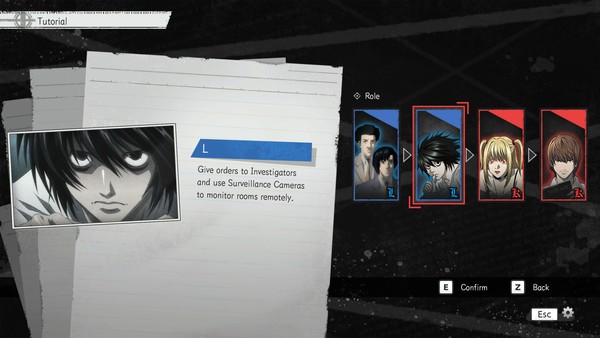 ©Tsugumi Ohba, Takeshi Obata/ Shueisha ©DNDP, VAP, Shueisha, Madhouse ©Bandai Namco Entertainment Inc. As a design decision, I just can't wrap my head around this. Maybe this would make sense in another online social deduction game that anticipated a sizable audience of children, but have kids that young even seen Death Note? Are those same kids not just sticking with their already familiar Among Us? The whole thing is baffling, and I can't fathom why KW—a Death Note game—decided to go this route with its messaging system. On the topic of voices, there's not a lot of voice acting in this game, but there are moments where you can hear L, Light, and Misa talking (although it's mostly just L and Light). Their original and massively talented Japanese voices—Kappei Yamaguchi, Mamoru Miyano, and Aya Hirano respectively—reprised their roles for the occasion. Disappointingly, but unsurprisingly, there is no dub option. Still, as much as I love the Death Note dub, the Japanese cast—and Miyano's trademark evil laughter, in particular—is also wonderful and deeply iconic, and I'm glad to hear them back in these roles after so long. I want to highlight how great it is that Hirano, in particular, got to be included (even if she didn't have as many lines as the others), as she's faced a lot of unfair treatment throughout her career, and frankly, deserves better. 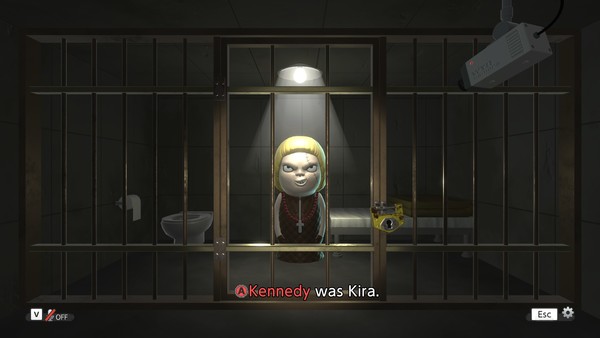 ©Tsugumi Ohba, Takeshi Obata/ Shueisha ©DNDP, VAP, Shueisha, Madhouse ©Bandai Namco Entertainment Inc. But getting back on track, whether you want voice chat or messaging, the game is still played the same: after being assigned a role, players enter a map for about 90 seconds. You receive tasks based on your role which you'll attempt to finish during this time. At the end of the 90 seconds, you and everyone else (who's still alive, anyway) will reconvene and discuss what took place during the 90 seconds—for example, if they saw something suspicious, or if they found a dying message on a dead player (which is to say: there are notepads you can mark players you've come into contact in. If you find a corpse, you can take and examine this notepad). During this time, players can vote for who they think Kira is. Wash, rinse, repeat until one side wins. Each side's goal is to identify and take down the leader of the opposing side, and/or to fill up their investigation/new world progress bar. This (it's the investigation progress bar for team L, and the new world progress bar for team Kira) is filled based on how many of the assigned tasks members of that team complete, and the game ends when one side manages to complete theirs (with that side winning). As for what the tasks actually are, usually, they amount to little more than following people, going to specific spots and standing there, and/or perhaps doing a few button presses. Investigators are trying to, well, investigate, while team Kira is trying to judge criminals and steal IDs from the investigators so Kira can write their names in the Death Note. L and Kira, in particular, also have additional tools at their disposal—among other things, L, for example, can set up cameras and monitor them, create joint investigations, and anonymously lead meetings. Probably the first thing you'll notice about the game itself (assuming you do the tutorial) is how overly complicated the tutorial makes a lot of these mechanics look on paper. To be fair, in practice, they aren't as complex as they sound—they're a bit tedious, sure, but if you know how to play Among Us, KW feels like that, but with extra steps. Still, there is something to be said about how intimidating it makes the game look. To say nothing of how pointless a number of these extra bells and whistles end up being, especially in a game where matches tend to be either really short or really long. 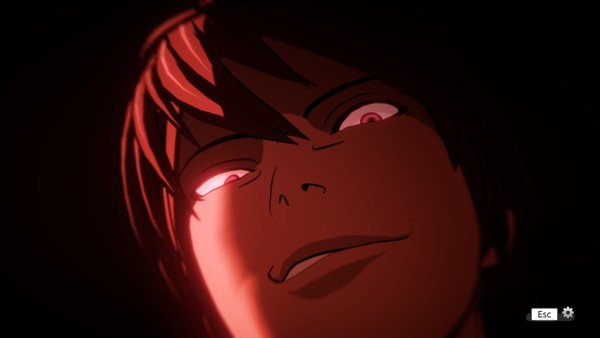 ©Tsugumi Ohba, Takeshi Obata/ Shueisha ©DNDP, VAP, Shueisha, Madhouse ©Bandai Namco Entertainment Inc. Speaking of, let's talk about the length that games tend to be. The fewer players there are (so, especially in 4-player rounds) the easier the game gets for team Kira. It's happened in more than a few matches that I've played that Kira would, by pure coincidence, happen to get L's ID first, thereby ending the game in a matter of seconds. It's really anticlimactic and mostly doesn't feel very in the spirit of Death Note. But even during the times when L's ID doesn't happen to be the first pulled, the fact remains that it can happen pretty suddenly. Even when the odds are at their absolute worst for the Kira player, they have a 1-in-9 chance of finding L by happenstance; little, if any, deduction is required. On the flip side, sometimes the game is ended by investigation/new world progress, which tends to draw the game out. But long games are equally unexciting—if not worse—for the players who end up dying in particular, as you're forced to sit and watch the whole match unless you want to end the game for everyone. By far the biggest flaw of this game is how, as of the time of writing, if any of the players disconnect for whatever reason, the game ends immediately and the remaining players are booted back to the waiting room. To be clear: this doesn't just happen when the host, L, or Kira disconnects. This happens when any player whatsoever, regardless of role or reason, disconnects. Of particular note, this includes disconnects from players with unstable internet connections, having issues with the cross-play, and more annoyingly, dead. To word that plainly: if you die, you have to stick around and watch the game to completion, otherwise it'll end for everyone. In a game where the matches can sometimes drag on, this can be incredibly irritating. Speaking of the cross-play, it mostly works, but with an asterisk. Right off the bat, it's amazing that this game has functioning cross-play at all—something that a number of fighting games, for example, don't always have. But most of the time I spent playing KW was with a group that was playing on PC, save for one PS5 player. And when a PC player hosted the room, after a few minutes the PS5 player—who didn't have any internet connection issues—would find themselves being randomly disconnected for no apparent reason. Recall that when one player, no matter who and for what reason, leaves the game early, everyone is booted back into the waiting room. But when we made it so that the PS5 player was the one hosting the room, we didn't experience any such issues. 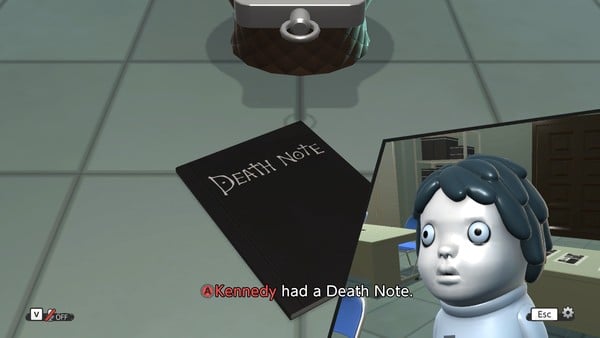 ©Tsugumi Ohba, Takeshi Obata/ Shueisha ©DNDP, VAP, Shueisha, Madhouse ©Bandai Namco Entertainment Inc. You might have picked up on this by now, but from a technical standpoint, this isn't a terribly well-put-together game. It's not tearing at the seams, but its shortcomings are as numerous as they are apparent. Some of them feel like things that could possibly be patched out in the future—the connectivity issues and preset messages, for example. Not only does that not account for the game's more baked-in issues, but also, just because that can happen (and I hope it does), doesn't necessarily mean it will. When you're playing with a good group, this game can be fun. But if the planets have to be in proper alignment for a game to be fun, I hesitate to call it a generally fun game. |
|
The views and opinions expressed in this article are solely those of the author(s) and do not necessarily represent the views of Anime News Network, its employees, owners, or sponsors.
|
| Grade: | |||
Overall : C
Graphics : C
Sound/Music : C
Gameplay : C-
Presentation : C-
+ Death Note suits the social deduction genre really well, and with the right group of players this can be really fun. |
|||
| discuss this in the forum (4 posts) | | |||